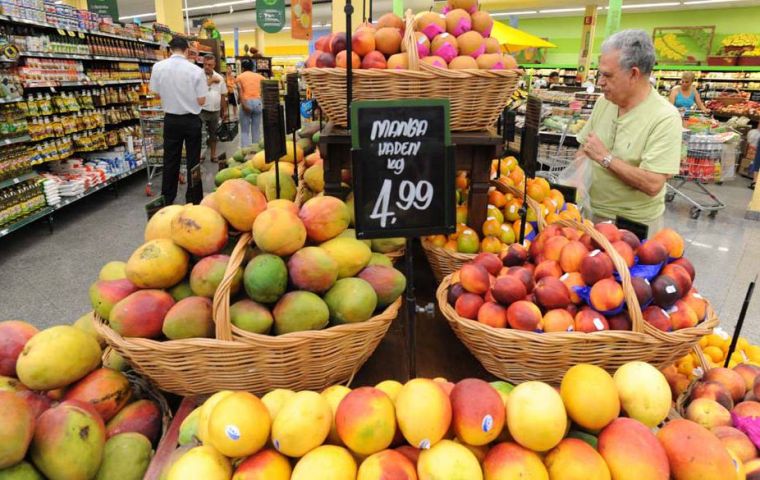MercoPress. South Atlantic News Agency
Brazilian inflation to peak in second quarter for 2019, forecasts Central bank
 A recent upswing in inflation past the midpoint of the 2018 target range should not prompt the bank to raise interest rates anytime soon
A recent upswing in inflation past the midpoint of the 2018 target range should not prompt the bank to raise interest rates anytime soon The Brazilian central bank on Tuesday forecast that inflation is likely to peak in the second quarter of 2019 before easing towards its target, adding that underlying inflation was at “appropriate” levels.
This would suggest that a recent upswing in inflation past the midpoint of the 2018 target range should not prompt it to raise interest rates anytime soon after far-right lawmaker Jair Bolsonaro’s victory in the presidential election reduced fears of a currency selloff.
“Recent changes in relative prices, in a context of anchored inflation expectations, seem to have contributed to raising inflation to levels compatible with the inflation targets, without posing risks to the maintenance of inflation at these levels once such relative price adjustments have taken place,” the bank said in the minutes of last week’s policy meeting.
The bank last Wednesday held its benchmark Selic interest rate at 6.50%, an all-time low, and said upward risks to inflation has lessened. That seemed to point to the Brazilian Real’s advance to a five-month high as investors bet that Bolsonaro, who has tapped a University of Chicago-trained banker as his prospective economy minister, will implement free-market reforms and curb a growing budget deficit.
A stronger currency could reduce import prices, bringing relief to the official inflation rate which is currently hovering slightly above the midpoint of the 2018 target. The bank targets 4.5% inflation in 2018 and 4.25% in 2019, plus or minus 1.5 percentage point.
Much of the recent inflation spike, however, stemmed from one-off effects such as shortages triggered by a nationwide truckers’ strike or higher energy costs. When stripped of volatile components, inflation has been hovering around 3.5%.
The central bank has repeatedly stated that there is no “mechanical relationship” between price shocks and monetary policy, and it would only react to such shocks if they affect expectations or wider inflation.
According to the minutes, policymakers will remove that language from its communication starting at the bank’s next meeting in December, “with the understanding that this should not be interpreted as a change in the conduct of monetary policy”.




Top Comments
Disclaimer & comment rules-

-

-

Read all commentsWill the inflation be proportional to the income?
Nov 07th, 2018 - 03:21 pm 0@:o))
Nov 08th, 2018 - 07:13 pm 0You mean, “will income be proportional to inflation” ?.....historically, never has.
@JB
Nov 09th, 2018 - 11:58 am 0:o((
I hoped that a New President may start making a New History - but from the looks of it [thank god!] everything is most likely to remain as it always had been! :o))
https://vasosdopurus.files.wordpress.com/2012/07/charge-crise2.jpg
Commenting for this story is now closed.
If you have a Facebook account, become a fan and comment on our Facebook Page!